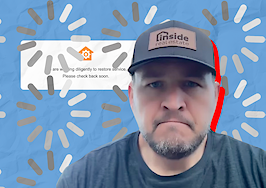This week, scholar and real estate consultant Mike DelPrete* released a new report with some surprising findings: iBuyers don’t appear to be ripping off consumers.
Specifically, DelPrete looked at Opendoor and Zillow and found that the cash offers those companies make on homes tend to be close to the actual value of those properties. That finding is significant because it suggests iBuying really isn’t home flipping, which typically involves buying a house at a steep discount then selling it for much more after major renovations.
In other words, Zillow and Opendoor aren’t making money by buying low and selling high.
To help break down what’s going on, and figure out what’s in store for iBuying, DelPrete hopped on a phone call with Inman Tuesday. What follows is a version of that conversation that has been edited for length and clarity.
Inman: You’ve said you hope this report helps reset the discourse over iBuying ripping people off. But why is that how people describe iBuying?

Mike DelPrete
DelPrete: First off, this model is really similar to house flipping. It’s like We Buy Ugly Houses. Human beings, we have all these cognitive shortcuts where if we see something new we automatically try to relate it to the closest thing we’ve seen to that. And in the case of iBuying it’s home flipping.
The second reason, I think, is industry fear of a potential disruptor. If there’s something new that comes along that’s viewed as a threat to industry incumbents — and those would be agents brokers, other players in the space — they’re going to resist it.
Speaking of disruption, these iBuyers still focus on middle class houses in the Sunbelt. So how disruptive can iBuying really be with such a small buy box, and will iBuying ever break out of it?
I think it could, but I don’t think it needs to. If I was heading up those organizations I wouldn’t be focused on it. I mean, what is disruptive? With the real estate market as big as it is in the U.S., you could build a billion dollar business just by capturing half a percent of that.
And Zillow said that. Rich Barton, his goal there is to get to 1 percent of total transactions. That’s 60,000 houses a year. That’s 5,000 a month. That’s exponentially greater than what Opendoor and Zillow are doing right now. But that’s one percent market share and that still would be a huge business for them.
If I were the iBuyers, I’d stay in my lane and focus on what they’re really good at. Which is buying, refurbishing and reselling turnkey houses in that median price range. Why get fancy if you don’t need to?
I was surprised the report found that the iBuyers are seeing relatively small amounts of price appreciation on their flips, and that appreciation appears to be trending down. Will that trend continue, or will the iBuyers be able to improve those numbers?
I’ll say this, if Zillow wasn’t in the game I don’t think those numbers would be going down. I think it has to do with the fact that Zillow is in and they’re big and it’s a land grab for market share.
As a public company Zillow can afford to lose more money for longer than anybody else. They’re in it to win it, and they’re in it for the long game. They’re probably exerting a significant competitive pressure and that’s why those numbers are going down.
But to your point, even if Zillow wasn’t in this game and you look at the numbers last year and you look at just Opendoor, they’re still really small numbers.
I think it just goes to prove that what the iBuyers have said all along is basically true. They’re not looking to make a lot of money on that flip. They have to make money somewhere else.
So where is that somewhere else?
What they say is it’s the fee. But if you look at Zillow’s earning statements, they’re still losing money even with the fee. So they’re not quite at break even yet. I don’t know where Opendoor is, but I would be very surprised if as a company, nationally, they’re a profitable business.
So I think where they make money, and this is no secret, it’s about the transaction. It’s about those ancillary services. You start getting mortgage and title. You refer out leads to affiliated brokers. That’s how you make real money.
So how big is iBuying going to get?
The total market share of iBuyers is still really, really small. I think the evidence supports low single digit market share.
They’ve been in Phoenix for four or five years. Market share in Phoenix of all iBuyers total is 5 or 6 percent. Phoenix has been blitzed with advertising and marketing. If you’re thinking about selling your home in Phoenix, you’ve probably heard of Opendoor or Zillow.
Five to 6 percent market share means that 90-plus percent of people probably have awareness of iBuyers but choose not to use them for whatever reason.
I think it’ll continue to incrementally grow. But I’ve yet to see any sort of evidence that it’ll get to anything greater than that.
Recently we’ve seen trouble at WeWork, and that has translated into some skepticism about venture-backed companies, and Softbank in particular — which is also funding some iBuying. Do you see any difficulty for iBuyers raising funds on the horizon?
The short answer is yes, but I don’t think it’s going to have a huge impact. What the WeWork-Softbank fiasco has taught us is that we — consumers, investors, companies — need to be asking some pretty pointed questions about long-term profitability. You can’t just lose money forever. There has to be a path toward profitability.
I don’t think the WeWork debacle is going to make people say every company needs to be profitable out of the gate. Venture capitalists are still going to be willing to invest and have companies lose money for a long time before they become profitable. But more people are asking questions. And those are good questions to ask.
Finally, what do you think is coming next for iBuying?
I think there’s a couple of things. The first is defining what iBuying actually is. In my definition, a critical component of iBuying is offering fair market value for homes. As I illustrated in my report that’s like 98.5 to 99 percent of a home’s value. That’s really high. So if you want to call yourself an iBuyer that’s what you need to be offering. If you’re giving people a 5 percent discount, a 10 percent discount, it doesn’t count. To me, that’s not iBuying.
There’s a lot of quote-unquote iBuying services being launched. Realogy has their thing, Keller Williams has a partnership with Offerpad. There’s RedfinNow. There’s a lot of incumbents waking up and trying to launch programs. And they slap a label on it and say this is our iBuying program.
But my guess is that at the end of the day, they’re not offering as good of offers to consumers as Zillow and Opendoor are.
But what’s next is the intersection between iBuyers and traditional industry. It’s gotta be a tool in the tool box if the consumer wants it. So I think the intersection between these two worlds is what’s next, and is going to be really interesting for the industry.
The real estate agents who are scared of change and ignorant of what iBuying actually is are doing a disservice to their potential customers — and is not going to work in the long term.
*Mike DelPrete is a scholar-in-residence at the University of Colorado Boulder, and also consults for various real estate various companies. DelPrete is not currently working for any iBuying companies, but said that he is retained by firms with an interest in iBuying and its impacts.













